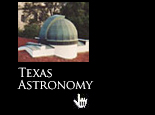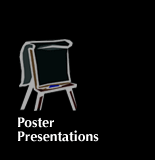
|
|


|
Poster Presentations Non-axisymmetric Instabilities in Core Collapse Supernovae Shizuka Akiyama, University of Texas at Austin abstract The H II Region of the First Star Marcelo A. Alvarez, University of Texas at Austin abstract Dwarf Galaxies over the last 2 Gyr Fabio D. Barazza, University of Texas at Austin abstract TEXES Observations of Molecular Hydrogen Emission from AB Aur Martin A. Bitner, University of Texas at Austin abstract Low Resolution Phase Resolved Spectra of Polars Ryan K. Campbell, New Mexico State University abstract Weak-line T Tauri Star Disks in the Spitzer c2d Survey of Molecular Clouds: New Constraint on the Timescale for Terrestrial Planet Building Lucas A. Cieza, University of Texas at Austin abstract The Mass Assembly History of Galaxies Niv Drory, University of Texas at Austin abstract Is Sersic Index a Good Pseudobulge Diagnostic? David B. Fisher, University of Texas at Austin abstract The Dark Halo in NGC 821 Amy D. Forestell, University of Texas at Austin abstract Mid-IR Spectroscopy of Red 2MASS AGN Lei Hao, Cornell University abstract White Dwarfs and Stellar Evolution Jason S. Kalirai, University of California at Santa Cruz abstract Cosmological Implications of a Solid Upper Mass Limit Placed on DFSZ Axions Thanks To Pulsating White Dwarfs Agnes B. Kim, University of Texas at Austin abstract Ice Absorption toward Background Stars Claudia Knez, University of Texas at Austin abstract Hi-Resolution Spectroscopy of a Volume-Limited Hipparcos Sample within 100 pc Pey Lian Lim, New Mexico State University abstract Low Carbon limits in Type Ia Supernovae Howie Marion, University of Texas at Austin abstract Modeling Swift GRB Prompt Gamma-ray Emissions Erin M. McMahon, University of Texas at Austin abstract Solving the Riddle of Convection with Pulsating White Dwarfs Michael H. Montgomery, University of Texas at Austin abstract Stellar Populations in Bulges of Spiral Galaxies Bhasker K. Moorthy, New Mexico State University abstract Searching for Planets around Pulsating White Dwarf Stars Fergal Mullally, University of Texas at Austin abstract
Eva Noyola, University of Texas at Austin abstract Texas Supernova Search: A Wide Field Search for Nearby Supernovae Robert M. Quimby, University of Texas at Austin abstract Photometry of Near Earth Asteroids at McDonald Observatory Judit Györgyey Ries, University of Texas at Austin abstract The Black Hole-Bulge Relationship for QSOs in the SDSS DR3 Sarah B. Salviander, University of Texas at Austin abstract Double-Barred Galaxies in N-body Simulations Juntai Shen, University of Texas at Austin abstract The Extended Structure of the Leo II dSph Galaxy Michael H. Siegel, University of Texas at Austin abstract White Dwarf Mode Identifications and Line Shape Variations Susan E. Thompson, Colorado College abstract Modeling Star Formation with Dust Andrea Urban, University of Texas at Austin abstract |
29 September 2005
Astronomy Program · The University of Texas at Austin · Austin, Texas 78712
prospective student inquiries: studentinfo@astro.as.utexas.edu
site comments: www@www.as.utexas.edu
Astronomy Program · The University of Texas at Austin · Austin, Texas 78712
prospective student inquiries: studentinfo@astro.as.utexas.edu
site comments: www@www.as.utexas.edu